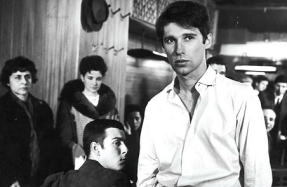Silence Is Falling

“We live surrounded with so many images. With so many images, with so many words, and so many feelings related to them.”
—Marinella Pirelli, Narciso (1966-67)
The recent exhibition at Milan’s Museo del Novecento, Light Movement: The Experimental Cinema of Marinella Pirelli (curated by Lucia Aspesi and Iolanda Ratti), has allowed for a long-overdue critical and institutional reassessment of a perennially underappreciated innovator of European experimental art—underappreciated perhaps partially because her work, in terms of both its content and the rate of its production, was marked by a gradual reduction, a steady move towards the minimal, the contained, and the intimate. Despite this, Pirelli’s moving-image work—spanning from the stop-motion animation Gioco di dama (1961-63) to Doppio autoritratto (1973-74), the radical self-portrait that heralded her final retreat from filmmaking—evinces an astonishing stylistic diversity, even as it was informed by a recurring concern with environments (both natural and artificial) and their navigation.

After abandoning her university studies in art history, in 1953 Pirelli (née proceeds to introduce a tiny sphere that at times serves as the head of an elegant ballerina doll, and at other points sets off a Fischingeresque play with abstract black-and-white shapes; the sphere’s movements are paralleled by the film’s soundscape, which moves between experimental electronic compositions and orchestral strings. Finally, the ballerina breaks free of the contained setting of the animation studio to float among flowers in a field, introducing a dichotomy between the natural and artificial worlds that would become a recurring motif in her work. Equally accomplished, if more narrative-based and oriented towards children, (1963-64) evinces a clear debt to Norman McLaren’s (1952) in its tale of two mute, bulbous figures who, pining after each other’s house plants, engage in an increasingly complex series of pranks and antics that ends with a lesson about the merits of camaraderie.
You’re reading a preview, subscribe to read more.
Start your free 30 days





